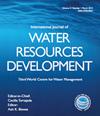Future of desalination in the context of water security
IF 2.2
3区 环境科学与生态学
Q3 WATER RESOURCES
International Journal of Water Resources Development
Pub Date : 2022-11-01
DOI:10.1080/07900627.2022.2138135
引用次数: 0
Abstract
In September 2022, the Saline Water Conversion Corporation (SWCC) of Saudi Arabia and Global Water Intelligence (GWI) organized an international conference on the future of desalination, in Riyadh. The SWCC was established in 1974 as an autonomous government institution. Since its formation, it has played an increasingly important role in fostering and improving desalination practices and processes not only in Saudi Arabia but also around the entire world. It is now a major force in the world of desalination and is also, by far, the largest global producer of desalinated water. The conference successfully brought together policymakers, developers, consultants, manufacturers, operators and researchers to discuss the future of desalination in the world. The conference was timely since the issue of the future of desalination, or the broader issue of the future of the world’s waters and the role desalination plays, needs to be discussed much more seriously. It was also very appropriate that SWCC convened this international conference since, as an institution, it probably now has more experience in producing and managing desalinated water than any other institution in the world. Refreshingly, presentations and discussions, for the most part, were based on real problems, issues and solutions in this sector rather than theoretical discussions. The organizers identified at least three important challenges that desalination will have to resolve by 2030:水安全背景下海水淡化的未来
2022年9月,沙特阿拉伯盐水转换公司(SWCC)和全球水情报公司(GWI)在利雅得组织了一次关于海水淡化未来的国际会议。SWCC成立于1974年,是一个自治的政府机构。自成立以来,它不仅在沙特阿拉伯,而且在全世界促进和改进海水淡化实践和工艺方面发挥了越来越重要的作用。它现在是世界海水淡化的主要力量,也是迄今为止全球最大的海水淡化生产商。会议成功地将政策制定者、开发商、顾问、制造商、运营商和研究人员聚集在一起,讨论世界海水淡化的未来。这次会议是及时的,因为海水淡化的未来问题,或者世界水域的未来和海水淡化所发挥的作用这一更广泛的问题,需要更认真地讨论。SWCC召开这次国际会议也是非常恰当的,因为作为一个机构,它现在在生产和管理脱盐水方面可能比世界上任何其他机构都有更多的经验。令人耳目一新的是,介绍和讨论在很大程度上是基于该部门的实际问题、问题和解决方案,而不是理论讨论。组织者确定了到2030年海水淡化必须解决的至少三个重要挑战:
本文章由计算机程序翻译,如有差异,请以英文原文为准。
求助全文
约1分钟内获得全文
求助全文
来源期刊
CiteScore
8.10
自引率
9.70%
发文量
23
审稿时长
1 months
期刊介绍:
International Journal of Water Resources Development is a policy and practice-oriented Journal that covers all aspects of water resources policy, management, development and governance. It is an interdisciplinary journal that focuses on water resources and their economic, financial, social and environmental-related impacts. Contributions which include the interdependences and inter-linkages between the water and the agricultural, energy, industrial and health sectors in both developed and developing countries, both at present and in the future, are welcome.

 求助内容:
求助内容: 应助结果提醒方式:
应助结果提醒方式:


